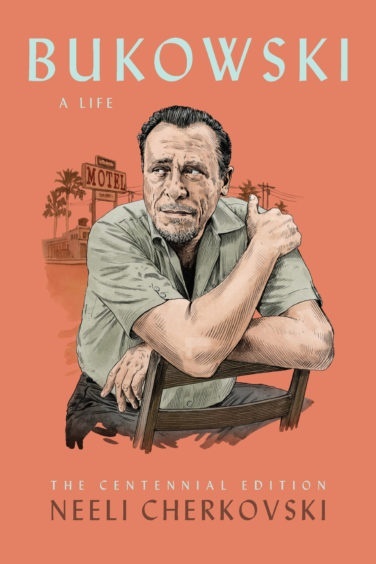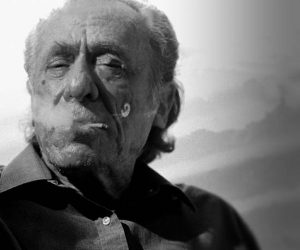Book Review: “Bukowski, A Life” — The Poet of Skid Row
By David Daniel
Some of the most insightful and moving parts of the biography are Neeli Cherkovski’s personal recounting of his on-again off again relationship with Charles Bukowski.
Bukowski, A Life: The Centennial Edition by Neeli Cherkovski. Black Sparrow Press, 376 pages, $18.95 (softcover).
 When Ernest Hemingway was once asked to describe the best preparation for being a writer, he cracked, “an unhappy childhood.” Charles Bukowski stands as a testament to that truism. “Fear made me a writer,” he said, “fear and a lack of confidence.” This year marks the centennial of Bukowski’s birth and, along with a new documentary film (Arts Fuse review) and reissues of some of his numerous books, comes this illuminating biography.
When Ernest Hemingway was once asked to describe the best preparation for being a writer, he cracked, “an unhappy childhood.” Charles Bukowski stands as a testament to that truism. “Fear made me a writer,” he said, “fear and a lack of confidence.” This year marks the centennial of Bukowski’s birth and, along with a new documentary film (Arts Fuse review) and reissues of some of his numerous books, comes this illuminating biography.
Henry Charles Bukowski was born in 1920 in Andernach, Germany to a German mother and American G.I. father who’d met in WW I. When he was three, the family returned to live in Los Angeles. A sullen and lonely child, Bukowski was teased in grammar school for the slight German accent he hadn’t lost yet. His father, a strict perfectionist, beat him for minor childhood failings. As an adolescent he was afflicted with severe acne, which ravaged his face and upper torso with boils; these scars, both inner and outer, never left him. He had few friends and, as with many a sensitive kid, rebellion ensued. He became defiant, a scrapper, very much the rebel. Decades later he chronicled these pained, cruel years in his novel Ham on Rye.
His discovery of the local library is probably what saved him. “The library was another world,” Bukowski said, “another people. It roared and leaped.” There he discovered writers like John Fante, Dostoevsky, and Hemingway, who showed how one could use words to make order of life’s pain, prompting him to undertake his own nascent efforts at writing.
It was a long quest, full of deprivation; but once embarked upon, although he often feared Skid Row would his final destination, he went at it with determination. He left his unhappy homelife, traveling around the U.S., living on the cheap in New Orleans, St. Louis, and Philadelphia, working at odd jobs to pay rent, and all the while writing, collecting piles of rejection slips. Ultimately, he returned to Los Angeles, and it was there that he staked the literary turf that would be his for the next forty-plus years.
Bukowski’s L.A. is not palmy La La Land. He and his characters inhabit the dilapidated, seedy districts that Raymond Chandler’s Phillip Marlowe knew: old stucco rooming houses, dive bars, and the broken-down denizens they attract. Failure continued; but, believing in himself, so did he.
Because they came more easily, he turned from stories to poetry. His poems had a direct, street quality, hyperbolic narratives of drunkenness and harlotry told in a language that often transcended its subject. His verse began to find a home in the little magazines that proliferated around the county during the ’50s; many were simple mimeographed & stapled affairs, often sloppily edited.
By the late ’60s Bukowski had garnered a growing renown in underground circles. This was how I first came to read him, when a fellow student at the University of Oregon told me about his newspaper column, Notes of a Dirty Old Man, in an L.A. weekly newspaper. “You’d like him,” he said, “he’s no b.s.” Over the ensuing years I read a lot by the man dubbed the poet of Skid Row, admiring his tough, deadpan style, but seeing, too, that his spirited celebration of the ordinary was in the lineage of Whitman and Sandburg.
Bukowski, A Life paints a rich portrait of its flavorful subject, who chose to be an outsider, living in furnished rooms, driving worn-out cars, working at dead-end jobs that he’d invariably quit or be fired from. He eventually settled into the tedious routines of the Post Office. But, as he proclaimed early on, “When I decided on this writing game, it meant blood on the line.” He persevered.
He believed that writers are made, not born, and so, with beer and smokes and classical music on the radio, he would sit down at his “typer” and work, taking all his hard luck days as the building blocks for his art and producing prodigious amounts of work. Eventually, he attracted enough readers; in the early ’70s he could finally quit the Post Office. As with the death of his father years before, he experienced a sense of freedom, of a two-ton weight taken off his shoulders.
Bukowski’s most inspired creation is himself — often in the form of his alter ego, Henry Chinaski, protagonist of most of his stories and novels. Cynic, lover, fighter, loser, survivor, Chinaski has heart.

Charles Bukowski — nothing if not determined. Photo: Wiki Commons.
The themes of Bukowski’s writing break along natural fault lines and clashing power differentials: landlord/renter, boss/worker, man/woman. He saw it as his cultural role to be on the margins, an underdog, a voice for the dispossessed. His ethos, if he can be said to have one, is a rejection of the grinding forces of conformity and middle-class values that he’d witnessed as a youth.
Biographer Neeli Cherkovski does justice to this commitment to rebellion. A well-regarded California poet and critic, he brings an insider’s familiarity, having been Bukowski’s friend for many years. With that access, including hours of their taped drinking sessions, he does a skillful job with the background details, the years of struggle, growth, and success. Some of the most insightful and moving parts of the narrative are Cherkovski’s personal recounting of his on-again off again relationship with the writer, which has the poignancy of personal memoir. To his credit, Cherkovski doesn’t spare us the writer’s dark parts, noting Bukowski’s sometimes loutish behavior: exposing himself outside a theater in LA’s tony Westwood Village, abusing friends, being possessive and jealous with lovers, and the hangovers and the puking. One important element the book is missing is a photo section with views of the key characters in Bukowski’s life.
Bukowski’s last novel, Pulp, was published in 1994, the year of his death. By that point Bukowski had enjoyed ever-growing acclaim and readership. He had begun to mellow. He never won any major literary awards, and wasn’t formally canonized, but the very fact of his being subject of a half dozen biographies suggests how his work still has the power to engage readers across generations. There is something very American in the arc of his story. Still, it begs the longer-term question: will he endure? I think so. In his novel Factotum, Bukowski observes that: when you’re in a bar, drinking, the world doesn’t go away. It’s still out there, but for the moment at least, it doesn’t have you by the throat. His books will offer future readers this hardscrabble vision, with its bittersweet solace, its sympathetic understanding of just how much survival takes out of you. “When people read me,” he said, “I want to think of them as not reading literature but actually participating in life.”
Almost forty years after my classmate recommended Bukowski to me, telling me he was “no b.s.” I used almost the exact same line when I gave my copy of Post Office to a Viet Nam vet postal worker I know. A few days later, he told me he’d loved the novel and had already ordered more of Bukowski’s titles. It’s the kind of working class homage Bukowski would have loved.
David Daniel is the author of more than a dozen books, including White Rabbit, a novel set in San Francisco in the Summer of Love, and four entries in the prize-winning Alex Rasmussen mystery series. His most recent book is Inflections & Innuendos, a collection of flash fiction. He has been the Jack Kerouac visiting writer in residence at the University of Massachusetts, Lowell

Rising out of the roughhouse of the backblocks of LA, living on lit’s vernacular streets, not hobnobbing with the belletristic, patrician, European types(Pace–Henry James, et al, Hello Mark Twain!), Buke laid it down
and delivered the mail, the dawning daily news tabloid thumping your door. Thank you, Buke, sorting it out
posting it, express and black-sparrowed air mail addressed to beat hearts. And thank you, Dave Daniel for
this pitch-perfect, true to the man, review!
Yep, the subject, the review, and the reviewer—no bs!
For employees, the post office of 1970 and the post office of 2020 pre-pandemic are as similar as biden and trump. There is zero comparison. Check it out.
For Dave Daniels:
Dave, I was actually thinking about you a few days ago and if you were still around, still alive, and still thinking and writing.
I’m a big Bukowski fan of late, and I had just sent a poem of his along to my son-in-law, also an English Teacher, who is the poetry editor of an on-line mag in Brooklyn. Bukowski has helped me get through these strange times as he embraces the dirty, poignant pieces of this often surreal and dank life. His choices of classical music also blend very much with my own, but I don’t cotton to cats.
Hopefully, this will get to you and we can be in touch again.
Ron Goodman
rongoodman@post.harvard.edu
Ron,
Great to read your voice, man. I will email you at the Harvard address.
The weakest BUK-Bio ever! Sad to say, but all the others are far better and Mr. Cheerkovsky mixed a little too much memory with fantasy ….
Reading Bukowski, A Life currently and am loving it. Bukowski wrote a lot and is a mixed bag but when his voice is working it’s spot on. And Post Office is a classic. Not to mentioning the enduring beauty of Black Sparrow books.
In the end no matter what all the would-be intellectuals think and say Bulkowski was a bum, a honest character. Confirms where bottom is.
And in this life we need bums and honest characters to show us where the bottom is as much as we need moderates and elites. Maybe in fact much more!
Can you imagine only elites?
Thx Dave. D